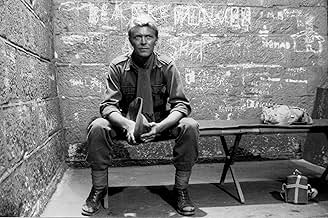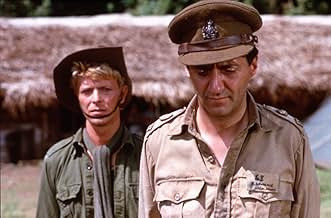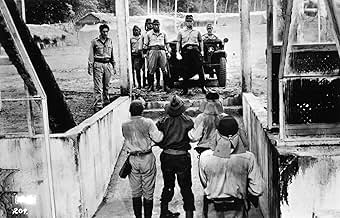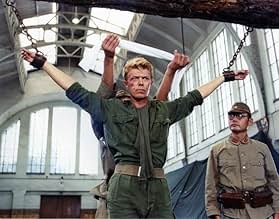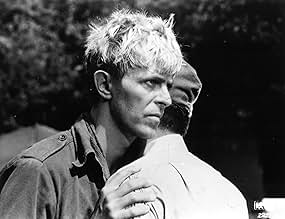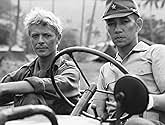IMDb रेटिंग
7.2/10
21 हज़ार
आपकी रेटिंग
अपनी भाषा में प्लॉट जोड़ेंDuring WWII, a British colonel tries to bridge the cultural divides between a British POW and the Japanese camp commander in order to avoid bloodshed.During WWII, a British colonel tries to bridge the cultural divides between a British POW and the Japanese camp commander in order to avoid bloodshed.During WWII, a British colonel tries to bridge the cultural divides between a British POW and the Japanese camp commander in order to avoid bloodshed.
- निर्देशक
- लेखक
- स्टार
- 1 BAFTA अवार्ड जीते गए
- 10 जीत और कुल 8 नामांकन
Takeshi Kitano
- Hara
- (as Takeshi)
Johnny Ôkura
- Kanemoto
- (as Johnny Ohkura)
Yûya Uchida
- Commandant of Military Prison
- (as Yuya Uchida)
Ryûnosuke Kaneda
- President of the Court
- (as Ryunosuke Kaneda)
Takashi Naitô
- Lieutenant Iwata
- (as Takashi Naito)
Rokkô Toura
- Interpreter
- (as Rokko Toura)
Yûji Honma
- PFC Yajima
- (as Yuji Honma)
फ़ीचर्ड समीक्षाएं
Based on Laurens van der Post's "The Seed and the Sower", "Merry Christmas Mr Lawrence" is an involving, almost unbearably moving and incredibly humane film. While Bowie toplines, the real star is Tom Conti as the eponymous British Officer trying to reconcile his respect for Japanese culture and innate humanity with the barbarity of the POW camp. Bowie has often been criticised for his acting, yet aside from a rather laughable flashback sequence where he impersonates a schoolboy, he is convincing as a mysterious and spirited "soldier's soldier" who has a beguiling effect on the young officer commanding the camp, played by Ryuichi Sakamoto, who quotes Shakespeare and issues brutal orders in almost the same breath.
Sakamoto, who is also a pioneer of electronic music with the Yellow Magic Orchestra, also wrote the soundtrack, including the famous "Forbidden Colours" theme (you probably know this even if you don't know where it's from) which conjures up the atmosphere of regret, lost love and repressed heartbreak in which we see the strange, unrequited love of Sakamoto's character for Bowie's. This film is about this impossible unrequited love and about the struggle of human values in wartime. As Lawrence (Conti) says to a Japanese Officer facing execution after the war; he is now the victim of "men who are sure they are right", just as in the camp the Japanese were sure they were right. The last scene between the decent, humane Lawrence and this officer, who was by turns hearty and brutal in the camp, is one of the most heartbreaking ever committed to celluloid.
Sakamoto, who is also a pioneer of electronic music with the Yellow Magic Orchestra, also wrote the soundtrack, including the famous "Forbidden Colours" theme (you probably know this even if you don't know where it's from) which conjures up the atmosphere of regret, lost love and repressed heartbreak in which we see the strange, unrequited love of Sakamoto's character for Bowie's. This film is about this impossible unrequited love and about the struggle of human values in wartime. As Lawrence (Conti) says to a Japanese Officer facing execution after the war; he is now the victim of "men who are sure they are right", just as in the camp the Japanese were sure they were right. The last scene between the decent, humane Lawrence and this officer, who was by turns hearty and brutal in the camp, is one of the most heartbreaking ever committed to celluloid.
SPOILER: I saw this movie when it came out more than 17 years ago. At the time a big deal was made about David Bowie being in it. He is, and does a fine job, but the movie isn't about his character. It is far more about the differences between East and West, and the cruelty of war. I was able to see it again last week on a cable channel.
To fully appreciate MCMR, try to understand the culture of both the captors and the prisoners at the time. To the prisoners, their existence in the camp is an unfortunate result of war, and should be temporary and not a life or death experience. To the Japanese captors, the prisoners who surrendered rather than died fighting are cowards, beneath the notice of the captors and likely not even viewed as human beings. They are expendable. But first, in this particular camp, there is an effort to "educate" the prisoners about the way a *true* warrior lives life (and dies). That is where the true conflict begins.
There are multiple physical and psychological struggles going on in MCMR. There is even some homoeroticism, though it isn't fully explained. There is certainly a lot of sadness, for characters on both sides. This point is brought home at the end, when the roles are reversed for two of the characters.
Even today, I can hum several parts of the score to MCMR, and they make me melancholy as I recall scenes from the movie. If you like movies that delve into the darker side of the human spirit (with some lightness thrown in), check out MCML. I rated it an 8.
To fully appreciate MCMR, try to understand the culture of both the captors and the prisoners at the time. To the prisoners, their existence in the camp is an unfortunate result of war, and should be temporary and not a life or death experience. To the Japanese captors, the prisoners who surrendered rather than died fighting are cowards, beneath the notice of the captors and likely not even viewed as human beings. They are expendable. But first, in this particular camp, there is an effort to "educate" the prisoners about the way a *true* warrior lives life (and dies). That is where the true conflict begins.
There are multiple physical and psychological struggles going on in MCMR. There is even some homoeroticism, though it isn't fully explained. There is certainly a lot of sadness, for characters on both sides. This point is brought home at the end, when the roles are reversed for two of the characters.
Even today, I can hum several parts of the score to MCMR, and they make me melancholy as I recall scenes from the movie. If you like movies that delve into the darker side of the human spirit (with some lightness thrown in), check out MCML. I rated it an 8.
David Bowie appears on the cover of this film, in spite of having one of the smaller major roles. After you see the movie you no longer question his presence there. His performance is magnificent. Watch for the understated behaviour regarding the flower.
This film is memorable because of a tremendous cast (including Jack Thompson- who keeps popping up in war movies) and a wonderful soundtrack by Ryuichi Sakamoto, who also performs in the movie. The soundtrack captures the jungle feeling, coupled with Japanese moods. Forbidden colours (song) has been known to give me goosebumps.
Very much, not your average War movie, _Merry Christmas Mister Lawrence_ is excellent because it portrays the relationship between captor and captive, victor and defeated. It's a movie about human spirit and love under dangerous circumstances! It's a movie about discipline and honour, especially the different way these are perceived.
This film is memorable because of a tremendous cast (including Jack Thompson- who keeps popping up in war movies) and a wonderful soundtrack by Ryuichi Sakamoto, who also performs in the movie. The soundtrack captures the jungle feeling, coupled with Japanese moods. Forbidden colours (song) has been known to give me goosebumps.
Very much, not your average War movie, _Merry Christmas Mister Lawrence_ is excellent because it portrays the relationship between captor and captive, victor and defeated. It's a movie about human spirit and love under dangerous circumstances! It's a movie about discipline and honour, especially the different way these are perceived.
It's 1942 in a Japanese POW camp in Java. Sgt. Hara is a sadistic guard unable to understand the prisoners' willingness to accept shame. British officer Col. John Lawrence is the Japanese speaking leader of the prisoners. Camp commander Capt. Yonoi joins in the court-martial of Maj. Jack Celliers (David Bowie) for leading a native revolt against the Japanese. Celliers is adjudicated a POW and Yonoi takes an interest in him.
These are four compelling characters. Tom Conti is solid. Ryuichi Sakamoto is interesting. Takeshi Kitano is absolutely brilliant. David Bowie delivers a mercurial performance. I want the plot to be bigger and more intense. It's also a bit long and meanders in the second half. I do love the final scenes with Hara and Lawrence.
These are four compelling characters. Tom Conti is solid. Ryuichi Sakamoto is interesting. Takeshi Kitano is absolutely brilliant. David Bowie delivers a mercurial performance. I want the plot to be bigger and more intense. It's also a bit long and meanders in the second half. I do love the final scenes with Hara and Lawrence.
Merry Christmas Mr. Lawrence, is one of those typical gems that you don't see that often because they are almost or very often underrated. I use the phrase typical because it is very much like that to underrate a non-mainstream movie like this one.
The story sets in Indonesia in the second world war, and tells the tale of a couple of British soldiers out in a Japanese camp for prisoners of war.
It gives us insight between the raging camp of the British soldiers with their Japanses guards. It tells the tale of prisoner Mayor Jack Celliers, a rebellious and confronting individual. It tells the tale of Prisoner Kolonel John Lawrence, who tries to build bridges between the two cultures who collide ever so often. It tells the tale of prison camp leader Captain Yonoi, who makes an effort in running things smoothly with understanding for his prisoners, but who, by the arrival of Mayor Jack Celliers, is being pressured, and discovers a whole new side of emotional understanding. It tells the tale of ward Seargant Hara, who doesn't seem to want to understand the prisoners, and would rather execute them than have them here.
Those 4 main characters come to interact with each other in very interesting ways, and the whole story rises to a dramatic climax which leaves it's impact.
The first degree acting makes this one of the most important things to watch this movie. Both British music legend David Bowie (As Jack Celliers) as well as Japanese music sensation Ryuichi Sakamoto (as Captain Yonoi) both have the lead in this epic picture. For Bowie it isn't this first time he appears on the big screen (The man who fell to earth, The Hunger),but it can be said that this is the role for which he will be remembered. Debuting here, Ryuichi Sakamoto plays the arrogant, and piped down captain Yonoi, and he doesn't make a bad figure with this. Truth is both musicians play very good, but the best parts are for debuting (at the time) comedian Takeshi Kitano (Srgt. Hara Ginko, and stage actor Tom Conti (John Lawrence) who steal the show. Conti's uptight and friendly character gives a lot of sympathetic gestures from the audience, and Takeshi has both the laughs and cry's (Watch the final scene) at his hand, for playing such a funny bastard.
Nagisa Oshima's direction is strong, and he leaves room for artistic influence for both cast and crew. He knows what he wants too show, and doesn't make the mistake of being to dramatic, or being to soft, on crimes that his fellow country committed in 1945. He stays realistic which works as a pro for this film.
The cinematography is beautiful, as well as the set and surroundings, but mostly, it is the score, the music, written by Sakamoto which leaves the most impression. A big plus, on all fronts and a absolute classic in it's genre. A must have and must see.
The story sets in Indonesia in the second world war, and tells the tale of a couple of British soldiers out in a Japanese camp for prisoners of war.
It gives us insight between the raging camp of the British soldiers with their Japanses guards. It tells the tale of prisoner Mayor Jack Celliers, a rebellious and confronting individual. It tells the tale of Prisoner Kolonel John Lawrence, who tries to build bridges between the two cultures who collide ever so often. It tells the tale of prison camp leader Captain Yonoi, who makes an effort in running things smoothly with understanding for his prisoners, but who, by the arrival of Mayor Jack Celliers, is being pressured, and discovers a whole new side of emotional understanding. It tells the tale of ward Seargant Hara, who doesn't seem to want to understand the prisoners, and would rather execute them than have them here.
Those 4 main characters come to interact with each other in very interesting ways, and the whole story rises to a dramatic climax which leaves it's impact.
The first degree acting makes this one of the most important things to watch this movie. Both British music legend David Bowie (As Jack Celliers) as well as Japanese music sensation Ryuichi Sakamoto (as Captain Yonoi) both have the lead in this epic picture. For Bowie it isn't this first time he appears on the big screen (The man who fell to earth, The Hunger),but it can be said that this is the role for which he will be remembered. Debuting here, Ryuichi Sakamoto plays the arrogant, and piped down captain Yonoi, and he doesn't make a bad figure with this. Truth is both musicians play very good, but the best parts are for debuting (at the time) comedian Takeshi Kitano (Srgt. Hara Ginko, and stage actor Tom Conti (John Lawrence) who steal the show. Conti's uptight and friendly character gives a lot of sympathetic gestures from the audience, and Takeshi has both the laughs and cry's (Watch the final scene) at his hand, for playing such a funny bastard.
Nagisa Oshima's direction is strong, and he leaves room for artistic influence for both cast and crew. He knows what he wants too show, and doesn't make the mistake of being to dramatic, or being to soft, on crimes that his fellow country committed in 1945. He stays realistic which works as a pro for this film.
The cinematography is beautiful, as well as the set and surroundings, but mostly, it is the score, the music, written by Sakamoto which leaves the most impression. A big plus, on all fronts and a absolute classic in it's genre. A must have and must see.
क्या आपको पता है
- ट्रिवियाAccording to David Bowie, Nagisa Ôshima directed the Japanese actors with great detail. But when it came to the British actors, they were told to "do whatever it is you people do".
- गूफ़In the final scene in the prison cell, the cross belt of Lt Col Lawrence's Sam Browne is fitted back to front.
- भाव
Col. John Lawrence: You are the victim of men who think they are right... Just as one day you and captain Yonoi believed absolutely that you were right. And the truth is of course that nobody is right...
- कनेक्शनFeatured in David Sylvian & Ryuichi Sakamoto: Forbidden Colours (1983)
- साउंडट्रैकRide, Ride, Ride (Celliers' Brother's Song)
Composed by Stephen McCurdy
टॉप पसंद
रेटिंग देने के लिए साइन-इन करें और वैयक्तिकृत सुझावों के लिए वॉचलिस्ट करें
- How long is Merry Christmas Mr. Lawrence?Alexa द्वारा संचालित
विवरण
- रिलीज़ की तारीख़
- कंट्री ऑफ़ ओरिजिन
- भाषाएं
- इस रूप में भी जाना जाता है
- Merry Christmas Mr. Lawrence
- फ़िल्माने की जगहें
- Rarotonga, Cook Islands(prisoners camp in Java)
- उत्पादन कंपनियां
- IMDbPro पर और कंपनी क्रेडिट देखें
बॉक्स ऑफ़िस
- US और कनाडा में सकल
- $23,06,560
- US और कनाडा में पहले सप्ताह में कुल कमाई
- $99,221
- 28 अग॰ 1983
- दुनिया भर में सकल
- $23,76,612
- चलने की अवधि2 घंटे 3 मिनट
- रंग
- ध्वनि मिश्रण
- पक्ष अनुपात
- 1.85 : 1
इस पेज में योगदान दें
किसी बदलाव का सुझाव दें या अनुपलब्ध कॉन्टेंट जोड़ें

टॉप गैप
By what name was मेरी क्रिसमस, Mr. सॉरेन्स (1983) officially released in India in English?
जवाब

